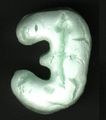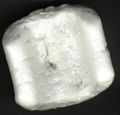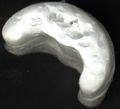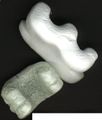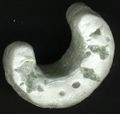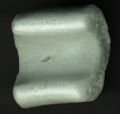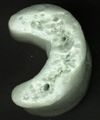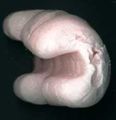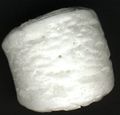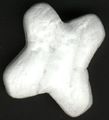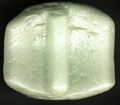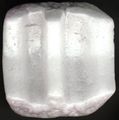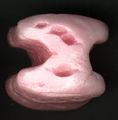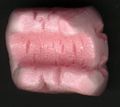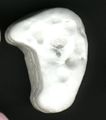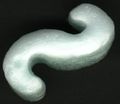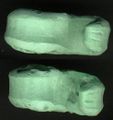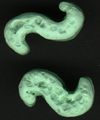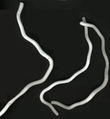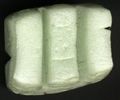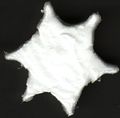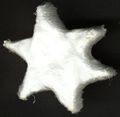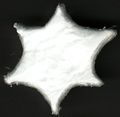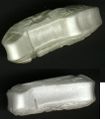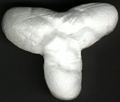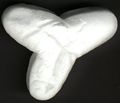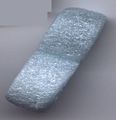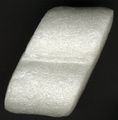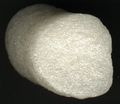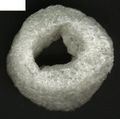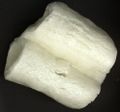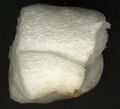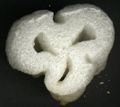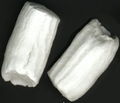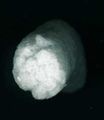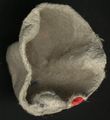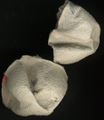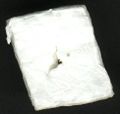Nern

Nerns are those little environmentally-unsound pieces of styrofoam that one used to find in boxes on a routine basis. During their heydey, they were known as packing peanuts, ghost turds, and other nernologically-insensitive terms. In fact, these are technically known as Nerns.
These beings were first identified by a friend of Hank from the Broadside in the ninth grade. But, in the years since then the science of nern classification has reached new heights.
An overview[edit | edit source]
The members of the order of pakaceae are generally polymer based, and often found in large groupings inside 'boxes', also known as kraft paper enclosures (KPE's, hereafter). The ANS generally concerns itself with the family Nernus. The Nernus members are single unit organisms and are, as Dr. Harriet Knoth of the University of Buffalo said, "small" (Knoth, 1982). Compare and contrast these to the Sterns, which are not in the Singlus family. Close inspection reveals that Sterns are, in fact, made up of many tiny units which appear to be held together to produce larger structures, often larger than even the largest Nernus family member. We at the ANS have no idea what the individual members of a Stern are doing so very close to one another, and frankly we don't want to know. Hence, our lack of research in that area. There are, at present, four major Genusi known in the Nernus family: Foamus, Starkus, and Plastus and Fuzzus. The penultimate is the largest group, and the one to garner the most research from the ANS. Each Genus is discussed in another topic here.
Behaviour[edit | edit source]
While it is very common to find groupings of only a single species in a KPE, one not infrequently will find several species from one genus cohabitating in a KPE. Sometimes members from multiple genuses will be found together (for a stirring account of one such find, see "They're all right here!", Weller, 1993).
Names[edit | edit source]
A common question asked of the learned members of the ANS is: "Why the name 'nern'?". Alas, we can't say definitively that we know the answer. In 1990, research found that in the distant past (probably the early 1980's), the friend of a person named Hank from the Broadside wrote an essay about these beings, and gave them the name Nern. This name was passed along in an oral tradition, thereafter, until 1990 when the early ANS (then, the Nernological Institute) started its research. No one knows if this name existed before then, but doctors surveyed reported that most people familiar with the term prefer it over the competition.
Catalog[edit | edit source]
Family: Singulus[edit | edit source]
Genus: Plastus[edit | edit source]
The Genus Plastus is the most common group in the Nernus family. They are identified by having an irregular surface: sometimes smooth and unbroken, sometimes cracked as if split by heat and expansion, and sometimes pitted with dozens of bubble craters. Sometimes all three skin details can be found on a single specimen.
- 3 nern (fourlessoneus)
- Bridge Nern (Bridgus)
- C Nern (kernigus)
- Cradle Nern (krattus)
No remaining samples of this species exist in the ANS archives
- Cross Nern (kros)
- E Nern (eeus)
- Eyeball Nern (occulus)
- Hi Nern (greetus)
- Integral nern (ogawdnotkalkulus)
- J Nern (janus)
- Pretzel Nern (pretzelus)
- Pringles Nern (junkfoodus)
- S Nern (essus)
- S (mini) Nern (essus-diminnus)
- Spaghetti Nern (stringus)
- Squere E Nern ()
- Star Nern (starus)
- ~ Nern (tildus)
- Y Nern (whyus)
Genus: foamus[edit | edit source]
Only three species of the Foamus genus have been identified. The members of this genus are identified by having a relatively soft surface, and to be very "squishy" (Bryant, 1991). They are resilient and return to an original form unless large pressures are exerted. It's notable that only members of the Foamus genus have been identified with a brownish coloring. Some speculate that Foamus members are actually reborn (recycled) from other materials, though no concrete evidence has been found to support this.
- Infinity nern (unendus)
- Inifinity (solid) nern (unendusfullus)
- Plug nern (plugus)
Genus: fuzzus[edit | edit source]
- Fuzzy-ring nern (skrachus)
Genus: starkus[edit | edit source]
Starkus is a new genus, having only been noted in the last couple years. It is believed by some that these originated in the offices of Apple Computer, and the ANS feels more research should be exerted to verify this. The members of this family have been found to dissolve in the presence of liquids. Some Nernovours report that the members of the Starkus are considerably easier to chew than a Nern or Foamus, and even have a nearly pleasant taste. Some studies done by the ANS suggest that the Sarkus are made of a starchy substance, akin to common corn starch, rather than the complex polymers that make up the members of the Nernus and Foamus families. Natrually, members of the ANS have not performed such experiments [consuming members of this family], since they would be in conflict with our signing the "Prevention of Cruelty to Nerns and Related Beings" accord of 1990. Preliminary research shows that members of the Starkus genus gradually shrink in size in captivity. The cause of this is not yet known.
- Binoculars (duoeyeus)
- Clover nern (nolukus)
- Solid Manacotti (solidmanakotus)
- Manacotti (manakotus)
- Closed Manacotti (klosmanakotus)
Family: undetermined[edit | edit source]
Genus: cardboardus[edit | edit source]
This is a relatively new genus. Researchers have yet to determine what family it belongs to.
- unclassified
Family: Multitudinous[edit | edit source]
Genus: sternus[edit | edit source]
- unclassified (angulus?)
This article is an incoherent mess. |

